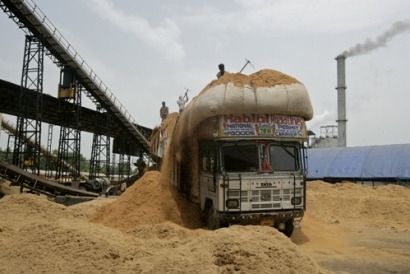
The Hindu newspaper reported recently that the Indian Biomass Power Association (IBPA) has written a letter to the Union Minister for New and Renewable Energy, Dr Farooq Abdullah, seeking his attention and intervention in addressing the concerns of its members.
Biomass power producers are currently facing an uncertain future as the Indian government dallies over reforms to the feed-in tariffs for biomass. These delays are starting to bite, as the costs of biomass plant feed stocks such as rice and coconut husk and forest waste are rising, along with plant operations and maintenance costs, making many projects across the country financially unviable.
The current tariff of about Rs 4 a unit is seen as inadequate, given the higher costs being endured, with a tariff of approximately Rs 5.75 to 6 a unit seen as more feasible.
Until the tariff is updated, which is not for some time since the arrangement set reviews are only every three years, biomass developers and producers are being forced into inaction.
According to the Secretary-General of the IBPA, Mr D. Radhakrishna, around 50% of the installed capacity of 1,100 MW across several Indian states is lying idle and there is demand-supply mismatch. In Rajasthan for example, only 32 MW of the total 80 MW of biomass capacity is operational.
Representatives of the association and biomass producers told The Hindu’s Business Line that the matters needs to be resolved quickly, given that recent requests made to the Central Electricity Regulatory Commission (CERC) have not been successful.
The Managing Director of Shalivahana Green Power, Mr M. Komariah, told The Hindu that only smaller plants are viable, explaining that once projects reach 10 MW and above, they becomes difficult to manage under the existing tariff structure. Komariah’s company has a total of 100 MW of biomass capacity spread across Madhya Pradesh, Andhra Pradesh and Odisha.
The IBPA has called for the Centre's intervention to resolve their issues and ensure that the pants run at their capacity and provide some relief to consumers.
This is especially urgent, given that the sector is finding it increasingly difficult to obtaining financing, partly due to the aforementioned fuel crunch.
"We are not lending to the sector since it does not have fuel security," HD Khunteta, chairman and managing director of Rural Electrification Corp told Economic Times, "There is need for an organised and regulated biofuel market, besides other policy interventions."
If the Indian government does not act, it is difficult to envisage how the biomass sector will meet the Government's target of 2,100 MW of new capacity by 2017, which requires an investment of Rs 10,500 crore.
[Inset: Kabbigere Gram Panchayat biomass plant in Karnataka]
For additional information:

